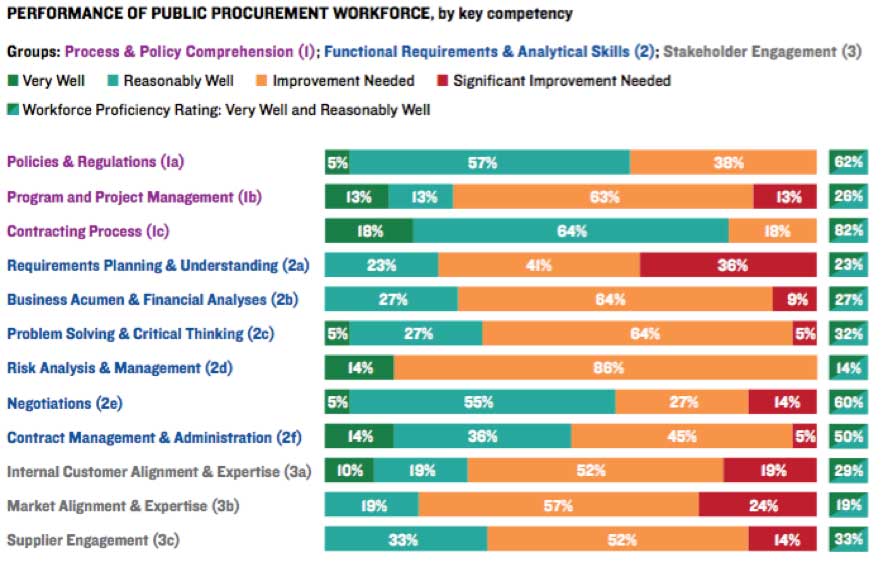
Flickr user CO-PhotoGuy
The Government Buys $2 Trillion Worth of Stuff Every Year. Here Are 5 Ways To Do It Better
Developing a competency framework for procurement professionals.
Every year, thousands of professionals at all levels of government in the United States execute contracts to buy $2 trillion in public goods and services, ranging from fighter jets to professional services to office supplies. Their work is crucial, yet too often we learn that the public procurement system is at the heart of government breakdowns such as the launch of Healthcare.gov or cost overruns in the development of the F-22 fighter. These headlines lead to grandstanding and finger-pointing, but fail to offer a clear sense of what skills those professionals need to effectively manage taxpayer dollars, and where progress is most needed.
That’s why the Volcker Alliance—launched by Paul A. Volcker to address the challenge of effective execution of public policies and to help rebuild public trust in government—teamed with Censeo Consulting Group and Public Spend Forum to conduct a study to develop a draft competency framework laying out the core skills of an effective procurement workforce. We conducted detailed interviews of 43 leaders with deep experience in the procurement community—including practitioners at all levels, public affairs scholars, private and public sector procurement thought leaders, and government suppliers—to get their impressions on how the workforce is currently performing along that framework.
To start, we felt it was important to identify the competencies, since no universal framework existed. More than anything, we felt it was important that the framework be simple and implementable, focusing on a few key competencies. Through our research and interviews, we ended up with 12 competencies, as opposed to the dozens we reviewed in other frameworks. (The competencies are reflected in the chart below.) This aligned well with best practice frameworks we saw in the world’s leading private sector organizations.
When we asked experts to rate the public procurement workforce on those competencies, the results were alarming. Of the 12 competencies we identified, the interviewed experts only rated the workforce as proficient in four. Even among the highest-rated competencies, no more than 20 percent of respondents rated the workforce as performing “very well.” Interviewees emphasized that there are pockets of excellence throughout government, and that improving public procurement requires structural changes as well. Nonetheless, public procurement’s leaders agree that targeted improvements in key skills are urgently needed.

The variation between the three groups of competencies is telling. Generally, the ratings for policy and process comprehension were higher, while competencies relating to functional requirements, analytical skills and stakeholder engagement were far lower. This paints a picture of a procurement workforce that is attentive to complying with established processes but could better apply key business skills and strengthen its relationships with government partners and outside markets.
The report includes detailed feedback on improving each individual competency. Five key takeaways emerged for how leaders within public sector organizations can help their procurement workforce enhance its contribution:
- Clarify procurement’s role. Many public sector leaders don’t understand procurement’s important role in meeting an organization’s mission. Removing this uncertainty and ensuring that procurement leaders have a seat at the table where decisions are made is an important first step.
- Align early with internal customers and deepen expertise in supplier markets. Successful procurement occurs when program managers and procurement officers sit down early, identify desired outcomes, and work backwards to find the right product or service. Procurement can enhance its contribution by developing focused expertise in common supplier markets such as professional services and information technology.
- Examine the impact of policies and regulations. The scale, complexity and occasional contradictions of procurement regulations can have the unintended consequence of harming outcomes. Some interviewees argued for top-down changes in policies and regulations, while others suggested that procurement leaders ensure that compliance is paired with the search for solutions.
- Promote smart risk-taking and innovation. Almost all interviewees agreed that the procurement workforce’s contribution to solving complex problems is limited by a risk-averse, change-resistant orientation. Agency leaders must encourage creative problem-solving and invest in training and recruitment that promotes this approach.
- Embrace data and technology. The growth of the open data movement, combined with demands from policymakers for evidence-based decision-making, is driving a more thorough analysis of procurement information to identify areas for improvement. A procurement office with a strong capability to analyze spending data from other agencies, states or cities stands to add considerable value.
This study and its draft competency model are not the final word on the topic, but we believe they are a useful starting point for the procurement community to carefully assess skills enhancement. We invite interested procurement officials and policymakers to download the report and send us your feedback so we can ensure this model is most helpful to the organizations doing this important work.
Raj Sharma is CEO of Censeo Consulting Group and chairman of the Public Spend Forum. He can be reached at rsharma@censeoconsulting.com.
Peter Morrissey is a program associate in the Volcker Alliance’s Public Service Excellence Program. He can be reached at pmorrissey@volckeralliance.org.
Photo: Flickr user CO-PhotoGuy
NEXT STORY: What Lawmakers Hope You Haven’t Noticed






